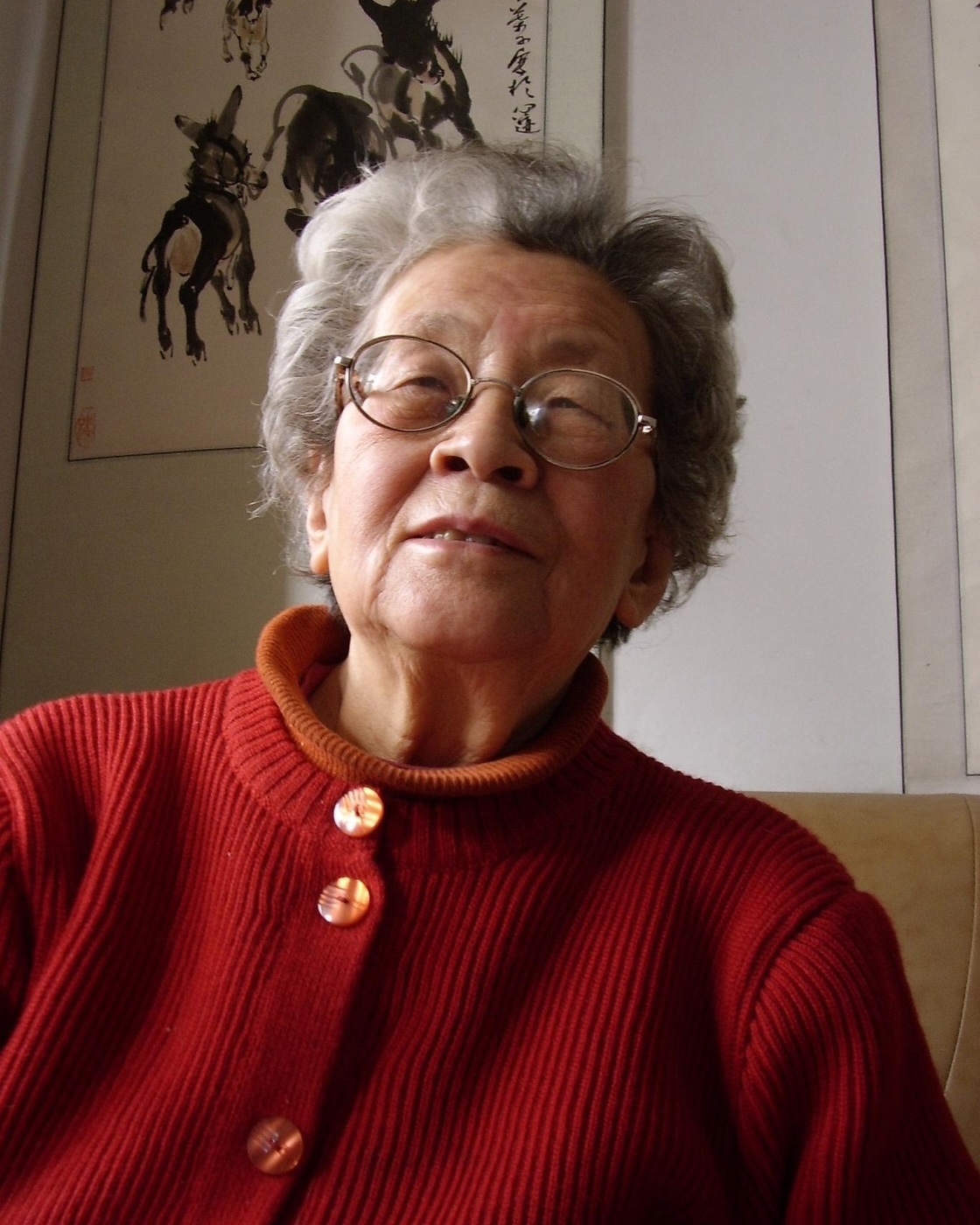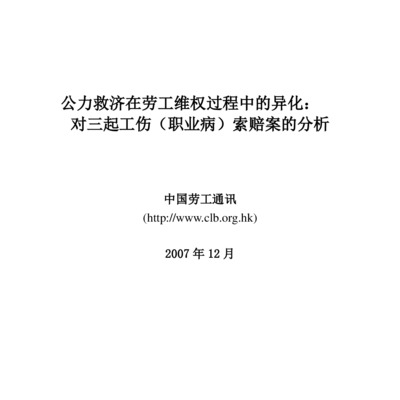
China Labour Bulletin Report Series on Labor Rights Protection in China
On June 12, 2025, the Hong Kong–based NGO China Labour Bulletin (CLB) announced its dissolution. This marks yet another Chinese civil society organization that ceased operations following the implementation of the Hong Kong National Security Law. Founded in 1994, CLB was dedicated to promoting the Chinese labor movement and had long focused on labor rights in China. Headquartered in Hong Kong, its founder Han Dongfang was a workers’ leader during the 1989 Tiananmen Democracy Movement and one of the founders of the Beijing Workers’ Autonomous Federation.
Over the years, China Labour Bulletin published dozens of reports in Chinese and English on China’s labor movement, addressing issues related to migrant workers, food delivery couriers, women workers, child labor, coal mining, and pneumoconiosis, among others. Following the organization’s dissolution, the China Labour Bulletin website was also taken offline.
In response, the China Unofficial Archives website immediately downloaded and preserved 80 Chinese- and English-language reports from the site. The following 26 reports are studies on the labor rights protection in China published between 2004 and 2024, including titles such as “Research Report on China’s Food Delivery Industry,” “Labor Rights in the Construction Industry,” “Healthcare Workers’ Rights Report,” and “Workers’ Rights in the Manufacturing Sector,” among others.

“The yearning for freedom is born from pervasive oppression”—Hu Ping on his 1980s essay, “On Freedom of Speech”
The China Unofficial Archives Interview Series No. 1

Fengming, A Chinese Memoir
Fengming, A Chinese Memoir is director Wang Bing's second feature-length documentary. The film primarily recounts the long and tragic experiences of an individual in China from the late 1940s to the 1990s, as narrated by the protagonist, He Fengming.
In 1949, with the founding of the People’s Republic of China, 17-year-old He Fengming enthusiastically dedicated herself to the socialist construction of the new nation. She and her husband worked as journalists at a provincial newspaper. In 1957, the Chinese Communist Party launched the Anti-Rightist Campaign. After her husband published three articles in the provincial newspaper, he was labeled a "rightist." She, too, was implicated by her husband and also branded a rightist. During several months of denunciation and struggle sessions, she endured such torment from others that she attempted suicide multiple times, but failed. One evening, returning home, her husband held her, and for the first time, his tears fell on her shoulder.
In April 1958, He Fengming and her husband were forcibly sent to two different labor reform farms in western China to undergo thought reform through labor. During her two and a half years at the farm, she experienced grueling physical labor, hunger, death, and psychological devastation. In 1960, she received a letter from her father informing her that her husband's life was in danger. She tried everything to find some food and, braving heavy snow, rushed to the farm where her husband was working. However, her husband had already starved to death.
For the next 20 years, He Fengming lived precariously, labeled as a rightist and raising her two young children, until her rehabilitation in 1979. In 1991, she returned to the labor reform farm where her husband had died, hoping to find his grave, but ultimately she did not succeed. In her later years, undeterred by external pressures, He Fengming used her pen and tears to document her painful life.
In 2007, the film won the Grand Prize in the International Competition section at the Yamagata International Documentary Film Festival in Yamagata City, Japan.
Wang Bing
Wang Bing (1967- ), an independent documentary filmmaker, was born in Xi'an and currently lives and works between China and France.
In 1992, Wang Bing graduated from the Lu Xun Academy of Fine Arts with a degree in photography. At that time, he conducted detailed observations of factory workers in the Tiexi District for his photographic work. In 1995, he began studying film at the Beijing Film Academy. Before becoming an independent filmmaker in 1998, he worked for a period at a television station. His first documentary, Tie Xi Qu: West of the Tracks, filmed in 2002, received numerous awards.
Wang Bing's films portray ordinary people who were laid off during China's recent economic transformation, presented with a rare aesthetic sensibility and uncompromising gravity. His films contain a beautifully tragic quality, where the transience of his characters' lives is elevated into parables. These works offer a deep reflection on the historical cost of progress in modern China and push realist cinema to its extreme.
In 2009, Galerie Chantal Crousel in Paris hosted his first solo exhibition, featuring two documentaries: Fengming, A Chinese Memoir and Man with No Name. Since then, Wang Bing has produced many documentaries, such as Three Sisters (2012), De'ang (2016), Bitter Money (2016), Mrs. Fang (2017), and 15 Hours (2017). The latter two were exhibited at Documenta 14 in Athens and Kassel in 2017.
From 2018 to 2019, Wang Bing served as a visiting artist professor at Le Fresnoy – Studio national des arts contemporains in France.
In 2017, Mrs. Fang was awarded the Golden Leopard, the highest prize at the Locarno Film Festival in Switzerland. In the same year, he also received the EYE Art & Film Prize in Amsterdam, Netherlands, in recognition of his entire body of work.
Wang Bing's significant solo exhibitions include: Cercle Cité, Luxembourg (2024); Le Bal, Paris (2021); Kunsthaus Zürich (2018-2019); CCA Wattis Institute for Contemporary Arts, San Francisco (2016); Centre Pompidou, Paris (2014). In 2018, the Museo Nacional Centro de Arte Reina Sofía and Filmoteca Española in Madrid held a major retrospective of his work.
He has participated in numerous group exhibitions, including: Museum of Applied Arts (MAK), Vienna (2023); Centre de la photographie Genève, Switzerland (2022); Marta Herford, Germany (2021); The Textile Museum, Washington D.C. (2020); Bowdoin College Museum of Art, Brunswick (2019); Shenzhen & Hong Kong Bi-City Biennale of Urbanism\Architecture (2017); Centrale for Contemporary Art, Brussels (2017); Jeonju International Film Festival (2015); Shanghai Biennale (2014); Filmmaker Festival, Milan (2010).
His works are held in the collections of: Museo Nacional Centro de Arte Reina Sofía, Madrid, Spain; M+ Museum, Hong Kong, China; Centre Pompidou, Paris, France; National Museum of Contemporary Art, Athens, Greece; Centre National des Arts Plastiques, Paris, France.

A Woman Warrior Who Defended Memory: Eyewitness of Jiabiangou, He Fengming, Passes Away
In remembrance of He Fengming, we honor her for the words she wrote with blood and tears, leaving us a powerful testament to the hardships endured.

What We Talk About When We Talk About “Sensitivity”: Chinese Politics Through the Lens of Political China
Why has political system reform, once a reform goal, gradually become a "sensitive term" and a taboo in China?

Hong Kong Apple Daily: Final Issue
On June 20, 1995, Hong Kong's Apple Daily was founded by businessman Jimmy Lai. It ceased publication on June 24, 2021. The paper was known for its critical stance on the Hong Kong political establishment and the Chinese Communist Party. Apple Daily offered a wide range of contents, including news from Mainland China, international news, and Hong Kong entertainment news. Its entertaining style made it popular among many Hong Kong citizens, but it sometimes generated controversies regarding journalistic ethics for its aggressive style of entertainment and news coverage.
On August 10, 2020, Hong Kong police arrested Apple Daily founder Jimmy Lai under Hong Kong’s National Security Law. He was denied bail and has been in detention ever since. On June 17, 2021, the National Security Department of the Hong Kong Police Force deployed over 500 officers to raid Apple Daily's headquarters. They arrested five of the paper's executives and froze approximately HK$18 million in company and related accounts, citing charges of "conspiracy to collude with foreign or external forces to endanger national security." With its assets frozen, Apple Daily could no longer pay its staff, and its operations ground to a halt, forcing it to announce its closure.
Apple Daily published its final issue on June 24, 2021. One million copies were printed, a record for its 26-year history. Hong Kong citizens queued up in long lines to buy the last issue, and all one million copies quickly sold out.
The front page of the final issue featured a large photo of Hong Kong citizens outside Apple Daily's headquarters, holding umbrellas in support of the paper on the eve of its closure. The headline read: "Hong Kongers bid painful farewell in the rain: 'We support Apple.'" This final edition contained 32 pages, including a 12-page special reviewing Apple Daily's history. It also featured farewell messages from readers, reporters, writers, and celebrities, alongside multiple pages highlighting significant front-page headlines from the paper's 26-year history. Beyond goodbyes and regrets, the last issue also reported on National Security Law cases in Hong Kong, featured a special report on mainland China's "residential surveillance at a designated location" system, and covered stories about Iranian dictators and journalists imprisoned for their speech in various countries.

Shi Binhai
Shi Binhai (1962-2018), pen name “Si Ren,” a native of Shanghai, is a journalist, commentator, and scholar of China’s reform era.
Shi graduated from Shanghai’s East China University of Political Science and Law in 1983. Shi was an editor at the Law Science Magazine, a journalist at China Market Economy News, an editorial board member of China Economic Times, and a board member of Hong Kong’s Sing Pao Daily News.
Shi co-edited the book Political China and his posthumous manuscript includes a finished second draft of the book Hua Guofeng At The Historical Turning Point. Shi was detained multiple times for short periods by the Chinese authorities for his work. He twice interviewed Zhao Ziyang during Zhao’s home detention. In December 2018, Shi died from a fall during a fire at his home.











